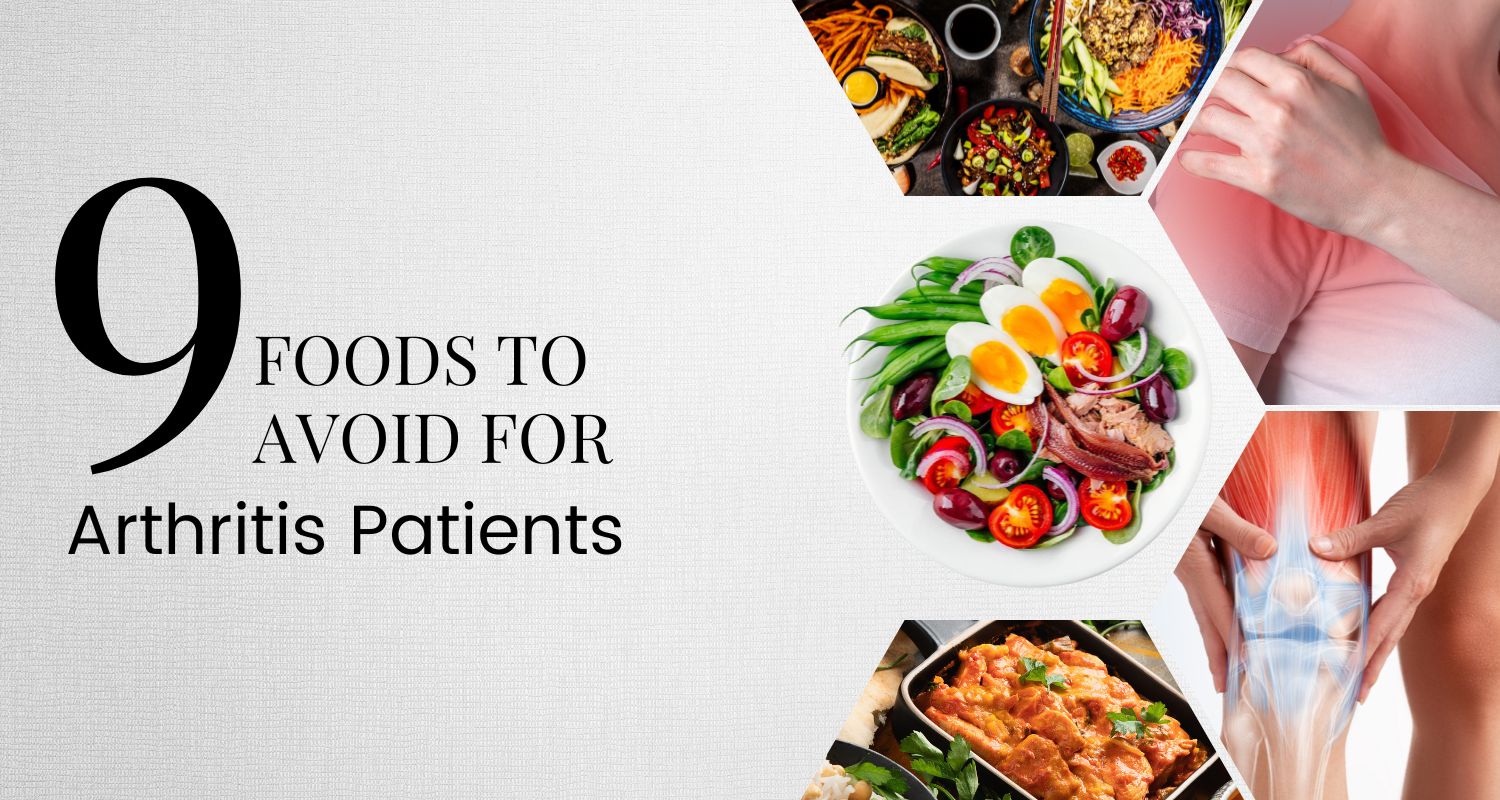Arthritis, a condition characterized by inflammation of the joints, affects millions of people worldwide. While there are various types of arthritis, including rheumatoid arthritis, psoriatic arthritis, and gout, they all share a common element – inflammation.
One aspect of managing arthritis and reducing the risk of complications is making informed dietary choices.
In this blog, we’ll explore the foods and beverages to avoid for arthritis, with a particular focus on rheumatoid arthritis (RA).
1. Gluten Foods
Gluten, found in wheat, barley, rye, and many grain-based products, has been linked to increased inflammation in some individuals. While the precise relationship between gluten and arthritis isn’t entirely understood, evidence suggests that a gluten-free diet may help alleviate arthritis symptoms for some people.[1]
Additionally, individuals with celiac disease, an autoimmune condition triggered by gluten, have a higher risk of developing rheumatoid arthritis. Although more research is needed to confirm the benefits of a gluten-free diet for arthritis, it’s a dietary avenue worth exploring, especially if you suspect gluten sensitivity.
2. Added Sugars
Added sugars are prevalent in a wide range of food and beverage items, from sweet treats like candy and desserts to unsuspecting culprits like sugar-sweetened soda, barbecue sauce, salad dressings, and ketchup.
Research has shown that in a study involving around 220 people with rheumatoid arthritis (RA), sugar-sweetened sodas and desserts were particularly likely to worsen arthritis symptoms.[2]
The link between added sugars and inflammation is well-established, making it a crucial dietary aspect for those with arthritis to address.
Reducing sugar intake can help mitigate inflammation, a primary driver of arthritis symptoms.
3. Red Wine and Other Alcohol
While red wine contains resveratrol, a beneficial antioxidant, alcohol consumption, in general, can be detrimental for those with arthritis. Drinking alcohol regularly may increase the risk of osteoarthritis and contribute to conditions like gout.
Additionally, 2019 research suggests a connection between alcohol intake and structural damage in axial spondyloarthritis.[3] For individuals with arthritis, it’s advisable to limit alcohol consumption to minimize the potential worsening of symptoms and complications.
4. Processed and Red Meats
Processed and red meats, including items like hot dogs, sausages, and hamburgers, have been associated with inflammation. People who consume these meats regularly may experience elevated levels of inflammatory markers, such as interleukin-6 (IL-6), C-reactive protein (CRP), and homocysteine.[4]
These markers are indicative of increased inflammation, which can worsen arthritis symptoms. Therefore, opting for leaner protein sources like poultry, fish, or plant-based alternatives can help reduce the inflammatory impact on your body.
5. Highly Processed Foods
Highly processed foods, such as fast food, packaged snacks, and sugary breakfast cereals, are typically loaded with refined grains, added sugars, preservatives, and other inflammatory ingredients.
Research indicates that these foods can contribute to inflammation and obesity, a known risk factor for arthritis, particularly rheumatoid arthritis (RA).[5] Avoiding highly processed foods and choosing whole, unprocessed alternatives like fruits, vegetables, and whole grains can help reduce inflammation and improve overall health.
6. Certain Vegetable Oils
Achieving a balance between omega-3 and omega-6 fats is crucial for arthritis management. A diet high in omega-6 fats and low in omega-3 fats can potentially exacerbate arthritis symptoms due to an imbalance that promotes inflammation.[6]
While omega-3 fats are found in fatty fish, seeds, and green vegetables, omega-6 fats are prevalent in vegetable oils like corn and safflower oil.
Opting for oils low in omega-6, such as olive oil, and increasing your intake of omega-3-rich foods can help maintain the desired balance and reduce inflammation associated with arthritis.
7. Foods High in Salt
High salt intake should be avoided as it can exacerbate arthritis symptoms. Foods high in salt, such as processed meats, canned soups, and certain cheeses, have been linked to increased arthritis severity.
One explanation is that salt stimulates immunological processes that lead to inflammation, making it detrimental for individuals with arthritis, particularly inflammatory types. Reducing salt consumption can contribute to better arthritis management.[7]
8. Sugar-Sweetened Drinks
Sugary beverages, including sodas, have been shown to significantly increase the risk of arthritis. A study involving young adults found that frequent consumption of fructose-sweetened beverages was associated with a higher likelihood of developing arthritis.[8]
Furthermore, these drinks can lead to elevated uric acid levels, which can worsen gout, another painful form of arthritis. Additionally, the sugar, aspartame, and phosphoric acid present in these drinks can interfere with calcium absorption, negatively impacting bone health.
9. Coffee and Milk
The role of coffee in arthritis management is multifaceted. On one hand, coffee contains antioxidants that can reduce inflammation, potentially benefiting individuals with arthritis. However, coffee also contains caffeine, which can affect some individuals negatively.
For coffee drinkers with arthritis, it’s best to limit consumption to 1-2 cups per day, avoid excessive additives, and refrain from consuming coffee close to bedtime. As for milk, it can be a trigger for inflammatory reactions in some individuals, but not everyone experiences this.
For those who tolerate it, milk is a valuable source of vitamin D and calcium. Opting for low or zero-fat dairy products can further reduce the risk of weight gain and unhealthy fats while enjoying the nutritional benefits.
Conclusion
Making informed dietary choices by avoiding these top 10 foods and beverages known to exacerbate inflammation and arthritis symptoms can significantly improve the quality of life for individuals dealing with arthritis.
Nevertheless, it’s advisable to consult with a healthcare professional or nutritionist for personalized recommendations tailored to your specific condition to ensure the most effective management of your arthritis.
References

